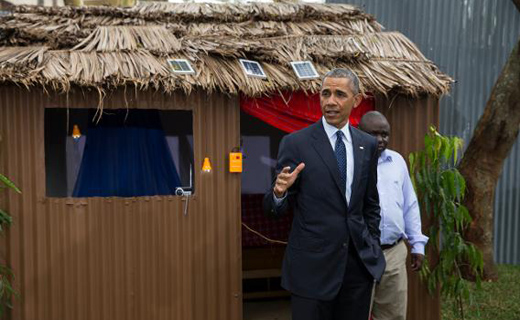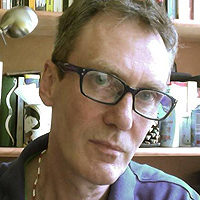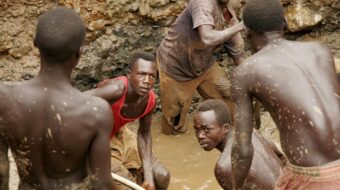
PRETORIA, RSA – Africans are used to having heads of state from the global north coming and telling them what they should be doing to lift their countries out of poverty. President Obama’s visit to Kenya and Ethiopia in East Africa at the end of July in many respects upheld that time-honoured tradition. But with an important difference.
Obama’s Kenyan paternal family background made his presence in the country as much a homecoming as a state visit. He was welcomed with open arms by an adoring public and upbeat local media. The same went for his visit to Ethiopia. For many people Obama is an African who just happens to be President of the United States.
This made it all the easier for him to speak frankly about things that worry many people across the African continent.
In his speeches in Nairobi and Addis Ababa he took up problems that are all too familiar on this continent but which don’t always get the high profile attention they deserve: the violent oppression of women and girls, corruption, bad governance in the form of leaders clinging to power, and support for gay rights.
The first three were widely reported by local media. But it mainly ignored the rigidly taboo issue of gay rights, which Obama raised while in Kenya. Most African countries outlaw LGBT identities. Kenya’s penal code, for instance, rules against homosexuality, which can carry a prison sentence of up to 14 years.
On the need to rid society of misogyny, Obama scolded Kenyan leaders and a selection of society’s elite gathered at the U.S. Embassy in Nairobi: “Any nation that fails to educate its girls or employ its women and allow them to maximize their potential is doomed to fall behind the global economy. Imagine if you have a team and you don’t let half of the team play, that’s stupid… That makes no sense.”
He was equally forthright on the blight of corruption: “Nothing will unlock Africa’s economic potential more than ending the cancer of corruption,” he told African Union leaders assembled in the AU’s splendid assembly hall – a gift from China – in Addis Ababa.
These were the topics that grabbed the most mainstream attention, including of the news media worldwide. For the most part they were welcomed as a breath of fresh air compared to the speeches people have to put up from most of the time from political leaders in Africa.
But perhaps that’s all it was – air. Because while Obama’s visit did result in some tangible investment benefits, what his audience got for the most part was a great dollop of worthy sentiment honed in the imperative. Granted, Obama did it better than almost any other head of state usually does, and he laid on the easy charm and eloquence that we have come to associate with him to make it memorable.
And yet, despite his African roots, Obama was seemingly unable to escape the mindset of a leader of a global imperial power coming to put Africa’s house in order, as if the main topics he dwelt on – gay rights included – are not already the subject of much pained effort and struggle for progress in government and society. If he had acknowledged that they are, it might have offered some perspective and nuance.
For Africans, a rule of thumb in such situations is to imagine what the effect would be if they could turn the tables. What if Kenya’s President Uhuru Kenyatta addressed a joint session of the U.S. Congress and said, “C’mon guys, if you really want to get the U.S. economy moving you’ve got to stop oppressing black Americans and stop shooting them on the streets the way you do. Because if you have a team and you don’t let all the team play, that’s stupid…” and so on. Imagine the headlines.
No matter how right the U.S. president was in the points he made, or even how well most of them were received among local media pundits, it would have made far more sense to cap the rhetoric and offer some practical support. Social spending support for advancing the education and skills of Kenyan women and girls would be welcome. So would boosting the African Union’s democracy building capabilities committing states to improved democratic governance. But sentiment is cheaper and makes a more immediate splash.
With much of Obama’s input on Africa’s problems, we were left with a “yes, but…” feeling. He was right to point out the corrosive impact of corruption, but on shakier ground when he stated that tackling it is the main key to realizing Africa’s economic potential.
Most African governments are fully aware that lack of education and skills, infrastructure and other areas of human development are the main blocks to economic prosperity.
Corruption doesn’t automatically repel investment. Most transnational corporations that are happy to invest in African countries are rewarded with tailor-made privileges, or operate in the ubiquitous special economic zones, that shied them from being hassled by corrupt officials.
Corruption is not an abstract evil. It is a crude and malign form of wealth redistribution in vastly unequal societies. It can wither away, with the help of law enforcement and clampdowns, once a more equitable dispensation is achieved. But it is notoriously hard to shift. It is more of a symptom than a cause of underdevelopment.
Obama was also right to take a swipe at the erroneous and harmful stereotypes of Africa as beset by war and poverty, long prevalent in the West. But war or armed conflict and poverty are still terrible blights in quite a few African countries and regions.
Twenty-eight African countries are involved in or affected by 21 armed conflicts of different types. Their numbers have grown following a decrease in armed conflicts after the end of the Cold War. New ones have emerged, and they are generally rooted in the meagre levels of social and economic development that most African populations, particularly in sub-Sahara Africa, have to endure.
This doesn’t mean that conflict and poverty typecast Africa any more than a lust for invading or sending drones to attack other countries fills the hopes and desires of the average U.S. citizen.
Africa is anyway too diverse, the strong points of its societies too varied and the dynamics of its evident rising prosperity too wide ranging for it to be accurately typified the way it usually is. But it would be unwise to ignore the impact of poverty and armed conflict as very real and growing problems facing parts of the continent.
Obama did address some of the problems of armed conflicts, but more in terms of anti-terrorism efforts against al Qaeda, ISIL, alShabaab and Boko Haram and of strengthening AU peacekeeping.
What he didn’t mention was the bigger picture of U.S. military involvement in Africa, especially with the under-the-radar US Africa Command (AFRICOM). This is steadily increasing its presence on the continent and with its “training exercises” gaining an influence over the defence forces of certain, mainly smaller, African states.
Boko Haram style insurgencies are major worries, but the roots of these and the more established conflicts, of the kind we see in the Democratic Republic of Congo, lie in persistent inequality and impoverishment, which the conflicts in turn perpetuate.
Western corporate involvement in Africa and the constant neo-liberal recipes for “structural adjustment” (known in the West nowadays as “austerity”) imposed by bodies such as the International Monetary Fund only exacerbate these crises by entrenching inequality, and in particular worsening the exploitation of women and girls.
Though the Obama depicted U.S. involvement in Africa as all about helping the continent realize its full potential, US rivalry with China protruded from some of his remarks.
He didn’t mention China directly but it was obvious which country he meant when he said “economic relationships can’t simply be about building countries’ infrastructure with foreign labor or extracting Africa’s natural resources. Real economic partnerships have to be a good deal for Africa. They have to create jobs and capacity for Africans.”
True enough. But it would be misleading to assume that China doesn’t do that.
For most African countries, China offers better deals, and they result in essential infrastructure, such as power plants, rail and roads telecommunications, transport, construction, waste disposal and upgrading ports. These are all the sorts of infrastructure that in their use and upkeep create jobs for Africans.
The vast difference in scale between U.S. and Chinese trade with Africa also shows that the actual “good deal for Africa” should be measured against what is, by implication, a less good deal for the continent. Last year U.S. trade with Africa was $73 billion, just under half of what it was in 2008. China, meanwhile, has doubled its trade with the continent since 2011 to $222 billion.
Unlike the U.S., China’s presence in Africa is accompanied by little or no rhetoric or sentiment on rights, governance or any social issues. China’s there to do business and leave the place better equipped than when it came.
The approach seems to have won over many African countries who are anyway increasingly opting for South-South economic relationships, in part because they provide a chance to delink from long-standing and notoriously unequal trade relations with Europe and other Western countries.
Obama’s visit to Kenya and Ethiopia did result in some tangible investment deals, though, notably for building a 100MW wind-power pant in Kenya worth $155 million, plus another $46 million toward a wind farm that will produce up to 301 MW of power.
By contrast, China’s financing of a 50MW solar facility in the country, together with a 1000MW coal-fired power plant. China’s financing of the projects amounts to cash investments six times larger than that of the U.S., and will result in the generation of two and a half times the amount of electricity.
For the crowds and audiences in Kenya and Ethiopia who came to hear Obama, his words struck a chord and his visit was momentous. But it’s hard not to think that it is what he didn’t say was almost as significant as what he did say.
Photo: Obama visits Kenya. | Evan Vucci/AP












Comments